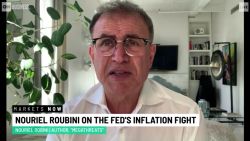Wall Street took a dive on Monday as coronavirus, Washington intransigence and earnings weighed on the market. All of this is creating a cocktail of uncertainty that the market doesn’t like one bit.
US stocks sold off all day, from the opening to the closing bell, and the selloff just gathered pace during the trading session.
The Dow (INDU) closed down 650 points, or 2.3%, after falling as many as 965 points at its low point. All Dow (INDU) stocks closed in the red except Apple, which eked out a .01% gain. It was the Dow (INDU)’s worst day since September 3.
The S&P 500 (SPX) – the broadest measure of the US stock market – closed down 1.9%, making it the index’s worst day since late September.
The tech-heavy Nasdaq Composite (COMP), which had briefly bounced back from its lows in the morning, finished down 1.6%.
Energy, industrials and financials stocks are the among the worst performers of the day. Those sectors that are more sensitive to the economy and the pace of the recovery felt more pain Monday, said said Eric Freedman, CIO at US Bank. But there were losses across all sectors.
What’s the deal with this selloff?
There’s a lot for investors to grapple with: The election is only eight days away, Congress hasn’t reached a deal on a new stimulus package and the first look at how the economy fared in the third quarter will be reported on Thursday. Big Tech companies will report earnings this week as well, including Microsoft (MSFT), Apple (AAPL), Google (GOOGL), Facebook (FB) and Twitter (TWTR).
While earnings will inject volatility in the tech sector, “on a more macro level, ongoing US stalemate over US fiscal stimulus and the rapidly spreading Covid-19 is going to determine the direction for the wider markets,” said Fawad Razaqzada, market analyst at Think Markets, in a note.
The ever-slimming chance of a new stimulus package before next week’s election isn’t a new factor for the market. And yet it has been a big driver of the action over the past weeks, even as nothing has really changed as a result of recent negotiations.
So what changed?
“I think the big difference this time around [is]…there’s been a tremendous amount of hope baked into the market for quite a while, and we saw some things over this weekend that hit those assumptions hard,” Brad McMillan, CIO of Commonwealth Financial Network, told CNN Business.
On Sunday the US hit a new record for average daily coronavirus cases. And the passing of the weekend dimmed hopes of a new stimulus deal, which is unlikely to get the needed votes in the Senate as Election Day approaches.
Absent economic stimulus, the US recession could “double dip” – a second wave of uncertainty and strife as coronavirus cases soar and businesses are forced to shut their doors. The prospects of having to lock down again are scary for economists and investors alike.
In Europe, the virus is spreading so quickly again that governments have brought back various restrictions. European markets finished in the red across the board.
How we got here
It’s been a roller coaster year for stocks. The three major indexes have rallied back – helped by hopes over government spending – after an ugly September, when tech stocks led a plunge nearly into correction territory.
The S&P is still about 5% above its late-September low, for example, even with Monday’s selloff.
McMillan said Monday’s downturn isn’t investors selling out of sheer panic, but rather a healthy repricing that more accurately reflects the state of the many situations afoot.
“There’s still a fair bit of cushion in prices even after today’s selloff,” he added.






















